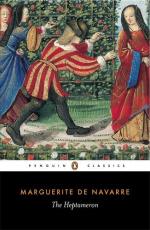To conceal the murder, he caused the corpse of the hapless dead man to be burnt, and the bones which were not consumed by the fire he caused to be placed in some mortar in a part of his house where he was building. Then he sent in all haste to the Court to sue for pardon, setting forth that he had several times forbidden his house to a person whom he suspected of plotting his wife’s dishonour, and who, notwithstanding his prohibition, had come by night to see her in a suspicious fashion; whereupon, finding him in the act of entering her room, his anger had got the better of his reason and he had killed him.
But before he was able to despatch his letter to the Chancellor’s, the Duke and Duchess had been apprised by the unhappy father of the matter, and they sent a message to the Chancellor to prevent the granting of the pardon. Finding he could not obtain it, the wretched man fled to England with his wife and several of his relations. But before setting out he told the murderer who at his entreaty had done the deed, that he had seen expresses from the King directing that he should be taken and put to death. Nevertheless, on account of the service that he had rendered him, he desired to save his life, and he gave him ten crowns wherewith to leave the kingdom. The murderer did this, and was afterwards seen no more.
The murder was so fully proven by the servants of the dead man, by the woman who had taken refuge with the Jacobins, and by the bones that were found in the mortar, that legal proceedings were begun and completed in the absence of St. Aignan and his wife. They were judged by default and were both condemned to death. Their property was confiscated to the Prince, and fifteen hundred crowns were to be given to the dead man’s father to pay the costs of the trial.
St. Aignan being in England and perceiving that in the eyes of the law he was dead in France, by means of his services to divers great lords and by the favour of his wife’s relations, induced the King of England (10) to request the King of France (11) to grant him a pardon and restore him to his possessions and honours. But the King of France, having been informed of the wickedness and enormity of the crime, sent the process to the King of England, praying him to consider whether the offence was one deserving of pardon, and telling him that no one in the kingdom but the Duke of Alencon had the right to grant a pardon in that duchy. However, notwithstanding all his excuses, he failed to appease the King of England, who continued to entreat him so very pressingly that, at his request, the Proctor at last received a pardon and so returned to his own home.(12) There, to complete his wickedness, he consorted with a sorcerer named Gallery, hoping that by this man’s art he might escape payment of the fifteen hundred crowns to the dead man’s father.
10 Henry VIII.
11 Francis I.




